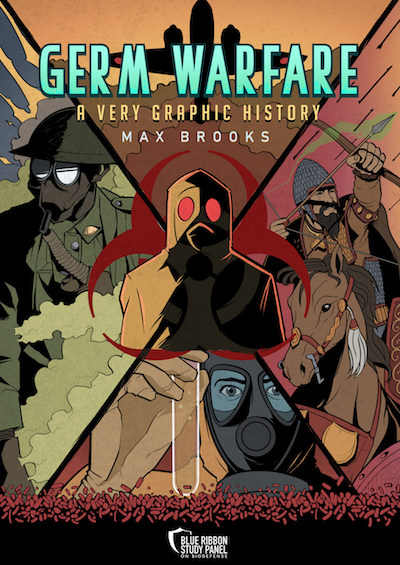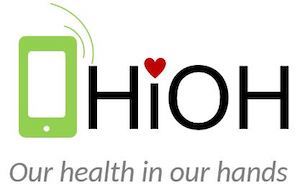pandemic
See the following -
A 'Very Graphic History' Of Germ Warfare
 Max Brooks, best-selling author of "World War Z" and non-resident fellow at the Modern War Institute at West Point, has partnered with the Blue Ribbon Study Panel on Biodefense to produce GERM WARFARE: A Very Graphic History. This highly stylized and engaging graphic novel, set for release this Saturday, depicts previous biological warfare events, the possibilities for the future, and the continued need for public health security. This is part of an effort by the bipartisan Panel to educate the public about biological risks and why a strong biodefense enterprise is critical to the health and security of the Nation.
Max Brooks, best-selling author of "World War Z" and non-resident fellow at the Modern War Institute at West Point, has partnered with the Blue Ribbon Study Panel on Biodefense to produce GERM WARFARE: A Very Graphic History. This highly stylized and engaging graphic novel, set for release this Saturday, depicts previous biological warfare events, the possibilities for the future, and the continued need for public health security. This is part of an effort by the bipartisan Panel to educate the public about biological risks and why a strong biodefense enterprise is critical to the health and security of the Nation.
- Login to post comments
A Web-native Approach to Open Source Scientific Publishing
 This summer, eLife was pleased to launch Executable Research Articles (ERAs) in partnership with Stencila, allowing authors to post computationally reproducible versions of their published papers in the open-access journal. The open source ERA technology stack delivers a truly web-native format that treats live, interactive code as a first-class asset. It was developed to address current challenges around reproducing and reusing published results-challenges mostly caused by the lack of infrastructure for publishers to showcase the richness and sophistication of the computational methods used by researchers in their work.
This summer, eLife was pleased to launch Executable Research Articles (ERAs) in partnership with Stencila, allowing authors to post computationally reproducible versions of their published papers in the open-access journal. The open source ERA technology stack delivers a truly web-native format that treats live, interactive code as a first-class asset. It was developed to address current challenges around reproducing and reusing published results-challenges mostly caused by the lack of infrastructure for publishers to showcase the richness and sophistication of the computational methods used by researchers in their work.
- Login to post comments
Affordable COVID-19 Diagnoses for Hospitals: How Open Source Software Helps
 The most common COVID-19 symptoms—such as coughing, fever, and shortness of breath—are shared with many other diseases. Diagnosing a patient accurately is therefore a challenge. Although a diagnosis of COVID-19 might not affect treatment, it would help a hospital predict a patient's trajectory and anticipate the need for urgent intervention. But current tests, relying on blood or mucus samples, are not particularly accurate. In this article, we'll see how open source software can help hospitals make better diagnoses. I'll concentrate on one specific role, and on the ways open source facilitates finding a solution and keeping it affordable. Many aspects of the problem feed into the solution discussed here. The article is based on work by researcher Trevor Grant.
The most common COVID-19 symptoms—such as coughing, fever, and shortness of breath—are shared with many other diseases. Diagnosing a patient accurately is therefore a challenge. Although a diagnosis of COVID-19 might not affect treatment, it would help a hospital predict a patient's trajectory and anticipate the need for urgent intervention. But current tests, relying on blood or mucus samples, are not particularly accurate. In this article, we'll see how open source software can help hospitals make better diagnoses. I'll concentrate on one specific role, and on the ways open source facilitates finding a solution and keeping it affordable. Many aspects of the problem feed into the solution discussed here. The article is based on work by researcher Trevor Grant.
- Login to post comments
An Epic Fight For the Metaverse—Fortnite Takes on the Big Tech Oligopolies
 You might have missed it amongst all the headlines about the U.S.P.S., the 2020 elections, and, of course, that little thing we call the pandemic, but Fortnite got kicked off Apple's App Store (and subsequently Google Play). I'm not a gamer, but I am fascinated by gaming, because, as Steven Johnson put it, "The Future is where people are having the most fun." Tim Sweeney, the founder and CEO of Epic Games, Inc., which makes Fortnite, seems to be having a lot of fun. And he thinks the future is the Metaverse. Healthcare, take note. The tech giants were reacting to Epic allowing "permanent discounts" on developer fees for in-game purchases made directly, rather than going through Apple or Google. Developers thus avoid the 30% commission charged in those Stores. Mr. Sweeney has been railing about the commission level for some time, leading to the recent decision.
You might have missed it amongst all the headlines about the U.S.P.S., the 2020 elections, and, of course, that little thing we call the pandemic, but Fortnite got kicked off Apple's App Store (and subsequently Google Play). I'm not a gamer, but I am fascinated by gaming, because, as Steven Johnson put it, "The Future is where people are having the most fun." Tim Sweeney, the founder and CEO of Epic Games, Inc., which makes Fortnite, seems to be having a lot of fun. And he thinks the future is the Metaverse. Healthcare, take note. The tech giants were reacting to Epic allowing "permanent discounts" on developer fees for in-game purchases made directly, rather than going through Apple or Google. Developers thus avoid the 30% commission charged in those Stores. Mr. Sweeney has been railing about the commission level for some time, leading to the recent decision.
- Login to post comments
Artificial Intelligence Cluster Modeling on COVID-19 Data at Scale Offers Opportunity for Improved Patient Outcomes
 Bitscopic Inc., a Silicon Valley based healthcare analytics company, has contracted with the VA Innovation Ecosystem 10X3 for a ground-breaking project to discover best practices in COVID treatment by examining large volumes of medical and other data sets from those who tested positive for COVID-19. The data includes patient health records, socio-economic data, epidemiological data for given geographic areas, and any available genomics or similar indicators for the discovery of significant patterns in patient subpopulations that can lead to improved care protocols and outcomes.
Bitscopic Inc., a Silicon Valley based healthcare analytics company, has contracted with the VA Innovation Ecosystem 10X3 for a ground-breaking project to discover best practices in COVID treatment by examining large volumes of medical and other data sets from those who tested positive for COVID-19. The data includes patient health records, socio-economic data, epidemiological data for given geographic areas, and any available genomics or similar indicators for the discovery of significant patterns in patient subpopulations that can lead to improved care protocols and outcomes.
- Login to post comments
CDC: Action Needed Now To Halt Spread Of Deadly Bacteria
Data show more inpatients suffering infections from bacteria resistant to all or nearly all antibiotics Read More »
- Login to post comments
Clade X pandemic exercise highlights policies needed to prevent or reduce the worst possible outcomes in future pandemics
 The outbreak of a moderately contagious and moderately lethal novel pathogen precipitated a catastrophic end to the scenario in Clade X, the day-long pandemic tabletop exercise hosted by the Johns Hopkins Center for Health Security on May 15 in Washington, DC. Clade X simulated a series of National Security Council–convened meetings of 10 US government leaders, played by individuals prominent in the fields of national security or epidemic response. Their dialogue as the scenario unfolded addressed significant uncertainties in current prevention and response capabilities, hamstrung by policy challenges at the federal level.
The outbreak of a moderately contagious and moderately lethal novel pathogen precipitated a catastrophic end to the scenario in Clade X, the day-long pandemic tabletop exercise hosted by the Johns Hopkins Center for Health Security on May 15 in Washington, DC. Clade X simulated a series of National Security Council–convened meetings of 10 US government leaders, played by individuals prominent in the fields of national security or epidemic response. Their dialogue as the scenario unfolded addressed significant uncertainties in current prevention and response capabilities, hamstrung by policy challenges at the federal level.
- Login to post comments
Corporate Resilience During A Pandemic
 As humanity grapples with the spread of COVID-19 globally, the emotional response is to do something, anything, everything. But how do we take that energy and successfully adapt? Most prudent organizations have had on their radar more visible threats like hurricanes, earthquakes, power outages, terrorism, and war. The quiet pervasiveness of a pandemic seems to have caught us by surprise. But is adapting to a pandemic really that different? The good news is that proven principles still apply. Read More »
As humanity grapples with the spread of COVID-19 globally, the emotional response is to do something, anything, everything. But how do we take that energy and successfully adapt? Most prudent organizations have had on their radar more visible threats like hurricanes, earthquakes, power outages, terrorism, and war. The quiet pervasiveness of a pandemic seems to have caught us by surprise. But is adapting to a pandemic really that different? The good news is that proven principles still apply. Read More »
- Login to post comments
Cyberattacks Predicted to Triple in 2021, Black Book State of the Healthcare Industry Cybersecurity Industry Report
 Seventy-three percent of health system, hospital and physician organizations report their infrastructures are unprepared to respond. The survey results estimated 1500 healthcare providers are vulnerable to data breaches of 500 or more records, representing a three hundred percent increase over this year. Black Book Market Research LLC surveyed 2,464 security professionals from 705 provider organizations to identify gaps, vulnerabilities and deficiencies that persist in keeping hospitals and physicians proverbial sitting ducks for data breaches and cyber-attacks.
Seventy-three percent of health system, hospital and physician organizations report their infrastructures are unprepared to respond. The survey results estimated 1500 healthcare providers are vulnerable to data breaches of 500 or more records, representing a three hundred percent increase over this year. Black Book Market Research LLC surveyed 2,464 security professionals from 705 provider organizations to identify gaps, vulnerabilities and deficiencies that persist in keeping hospitals and physicians proverbial sitting ducks for data breaches and cyber-attacks.
- Login to post comments
Germany's Healthcare System Is Using This Open Source Standard For Encrypted Instant Messaging
 A fast-growing open communication platform has been picked by the German healthcare system to support instant messaging between health professionals and organizations across the country. Called Matrix, the platform will provide German developers with the infrastructure, tools and protocols to build custom-made applications that will let up to 150,000 healthcare organizations securely share messages, data, images and files.
A fast-growing open communication platform has been picked by the German healthcare system to support instant messaging between health professionals and organizations across the country. Called Matrix, the platform will provide German developers with the infrastructure, tools and protocols to build custom-made applications that will let up to 150,000 healthcare organizations securely share messages, data, images and files.
- Login to post comments
Harvard Medical School, Kiel University of Applied Sciences and others are using Nextcloud in the response to COVID-19
 Nextcloud Hub is used in dozens of universities, hospitals, and medical institutes in various ways, aiding in fighting the pandemic. The DICOM viewer app for Nextcloud in particular is used in Brazil in the fight against COVID-19. At the Kiel University of Applied Sciences Nextcloud is used in the development of bluetooth measurement algorithms from the OHIOH.de research team. This is a research project using machine learning and AI to improve the accuracy of Bluetooth-based COVID-19 tracking apps where information is collected through "Bluetooth". The application focuses on research topics to warn and help with required actions in fighting and minimizing the spread of COVID-19.
Nextcloud Hub is used in dozens of universities, hospitals, and medical institutes in various ways, aiding in fighting the pandemic. The DICOM viewer app for Nextcloud in particular is used in Brazil in the fight against COVID-19. At the Kiel University of Applied Sciences Nextcloud is used in the development of bluetooth measurement algorithms from the OHIOH.de research team. This is a research project using machine learning and AI to improve the accuracy of Bluetooth-based COVID-19 tracking apps where information is collected through "Bluetooth". The application focuses on research topics to warn and help with required actions in fighting and minimizing the spread of COVID-19.
- Login to post comments
Hiding Our Heads in the Sand - Why the US is Unprepared for Pandemics and Disasters
 A new report from the Trust for America's Health minces no words. President and CEO John Auerbach charges: COVID-19 has shined a harsh spotlight on the country's lack of preparedness for dealing with threats to Americans' well-being. Years of cutting funding for public health and emergency preparedness programs has left the nation with a smaller-than-necessary public health workforce, limited testing capacity, an insufficient national stockpile, and archaic disease tracking systems - in summary, twentieth-century tools for dealing with twenty-first-century challenges.
A new report from the Trust for America's Health minces no words. President and CEO John Auerbach charges: COVID-19 has shined a harsh spotlight on the country's lack of preparedness for dealing with threats to Americans' well-being. Years of cutting funding for public health and emergency preparedness programs has left the nation with a smaller-than-necessary public health workforce, limited testing capacity, an insufficient national stockpile, and archaic disease tracking systems - in summary, twentieth-century tools for dealing with twenty-first-century challenges.
- Login to post comments
HLN Releases Update to Open Source Immunization Forecaster in Preparation for COVID-19 Vaccine
 On November 6, 2020, HLN released a new version (v1.24.2) of the Immunization Calculation Engine (ICE). ICE is a state-of-the-art open source software system that provides clinical decision support for immunizations for use in Immunization Information Systems (IIS), Electronic Health Record (EHR) and Personal Health Record (PHR) Systems.
On November 6, 2020, HLN released a new version (v1.24.2) of the Immunization Calculation Engine (ICE). ICE is a state-of-the-art open source software system that provides clinical decision support for immunizations for use in Immunization Information Systems (IIS), Electronic Health Record (EHR) and Personal Health Record (PHR) Systems.
- Login to post comments
IBM Report: Cost of Data Breaches Hit Record High During Pandemic - Healthcare Breaches Cost the Most By Far, at $9.23 Million per Incident
 IBM Security today announced the results of a global study which found that data breaches now cost surveyed companies $4.24 million per incident on average - the highest cost in the 17-year history of the report. Based on in-depth analysis of real-world data breaches experienced by over 500 organizations, the study suggests that security incidents became more costly and harder to contain due to drastic operational shifts during the pandemic, with costs rising 10% compared to the prior year...Healthcare breaches cost the most by far, at $9.23 million per incident - a $2 million increase over the previous year.
IBM Security today announced the results of a global study which found that data breaches now cost surveyed companies $4.24 million per incident on average - the highest cost in the 17-year history of the report. Based on in-depth analysis of real-world data breaches experienced by over 500 organizations, the study suggests that security incidents became more costly and harder to contain due to drastic operational shifts during the pandemic, with costs rising 10% compared to the prior year...Healthcare breaches cost the most by far, at $9.23 million per incident - a $2 million increase over the previous year.
- Login to post comments
Mozilla Announces Second Set of COVID-19 Solutions Fund Recipients
 Innovations spanning food supplies, medical records and PPE manufacture were today included in the final three awards made by Mozilla from its COVID-19 Solutions Fund. The Fund was established at the end of March by the Mozilla Open Source Support Program (MOSS), to offer up to $50,000 each to open source technology projects responding to the COVID-19 pandemic. In just two months, the Fund received 163 applicants from 30 countries and is now closed to new applications.
Innovations spanning food supplies, medical records and PPE manufacture were today included in the final three awards made by Mozilla from its COVID-19 Solutions Fund. The Fund was established at the end of March by the Mozilla Open Source Support Program (MOSS), to offer up to $50,000 each to open source technology projects responding to the COVID-19 pandemic. In just two months, the Fund received 163 applicants from 30 countries and is now closed to new applications.
- Login to post comments